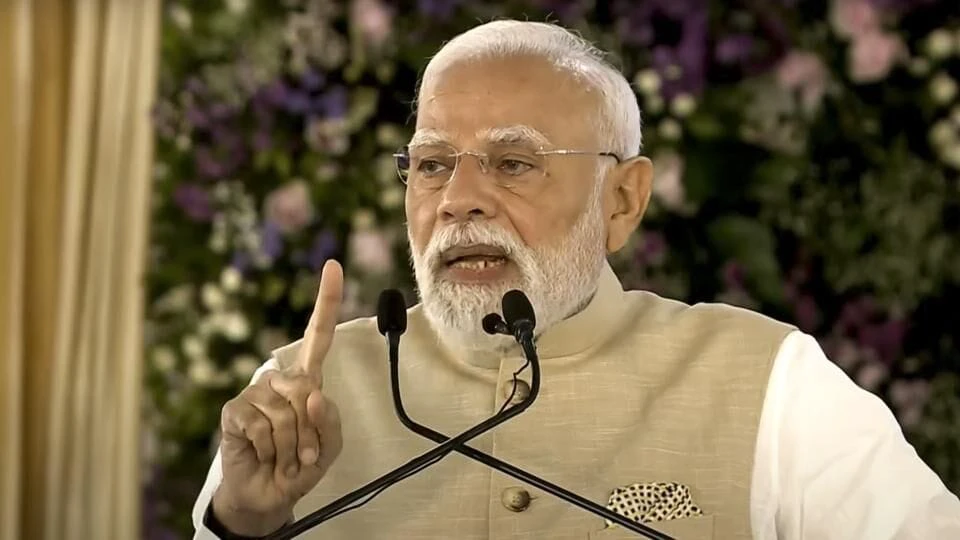Trump tariffs: A day before additional 25 per cent tariffs from the United States kick in, effectively raising import duties on India to 50 per cent, Prime Minister Narendra Modi on August 26 pushed for swadeshi and Make in India.
Speaking at the Maruti Suzuki’s launch of its first electric vehicle in India, e VITARA in Gujarat, Modi said that swadeshi should be the “mantra” and that irrespective of who puts in the investment, the production must be Indian, according to a PTI report.
Notably, Japan’s Suzuki Motor Corporation has committed an investment of ₹70,000 crore in India over a period of five-six years. The prime minister added that the country’s ‘Make in India’ initiative has created a favourable environment for both global and domestic manufacturers, and the world will drive India-made EVs.
Maruti Suzuki’s Hansalpur facility in Gujarat is set to export EVs to more than 100 countries. It will also produce lithium-ion batteries, cells, and electrodes for strong hybrid electric vehicles.
PM Modi emphasises ‘Make in India’
“My definition of swadeshi is very simple: it doesn’t matter whose money is invested, whether it is dollars, pounds, whether the currency is black or white, it doesn’t matter to me. What matters is that in production, the sweat belongs to my countrymen. The money may be someone else’s, but the sweat is ours,” PM Modi stated.
“By 2047, we will build such a Bharat that your future generations will take pride in your sacrifices, will take pride in your contributions. In that way, Maruti Suzuki is also a swadeshi company. The world will drive electric vehicles that are made in India,” he said.
The prime minister added that today is a “great day” for Make in India “as e-vehicles made in the country will be exported to 100 countries. The world will drive EVs that are made in India. The Make in India initiative has created a favourable environment for both global and domestic manufacturers”.
PM lauds India-Japan ties: ‘Made for each other’
Lauding ties between India and Japan, Modi said that the two countries are “made for each other”.
His statement came as Toshihiro Suzuki, Representative Director and President of Suzuki Motor Corp promised ₹70,000 crore investment in India over 5-6 years, aimed at strengthening operations in the country.
Later, giving details, Maruti Suzuki India Chairman RC Bhargava said the investments would be to meet the company’s target of achieving 40 lakh units annually.
“We are expanding to 4 million (units annually). So the expansion of 4 million units capacity, with all the supporting infrastructure and investment in R&D, and new technologies, all of that takes a lot of money,” Bhargava said when asked about areas where the investments are proposed to be made.
About the finalisation of the second plant to be set up in Gujarat, which was announced last year for an investment of ₹35,000 crore, Bhargava said, “I am hoping we will be answering that question more specifically after the GST Council meeting (on September 4) because after that everybody will be making an estimate of what the impact of the GST decisions are going to be on future growth.”
He, however, declined to comment on the implications of the proposed changes in GST slabs.
Suzuki Group, of which Maruti Suzuki India is a part, has already invested over ₹1 lakh crore in India. These investments have also led to the creation of over 11 lakh direct jobs in the value chain, as per the report.
On the e VITARA, Bhargava said it will be for the export markets, and no timeline has been set for launching the vehicle in the domestic market.
Maruti Suzuki’s Gujarat plant to export e VITARA to 100 countries
Manufactured exclusively at Suzuki Motor Gujarat (SMG), a unit of Maruti Suzuki India, the first batch of export-bound e VITARA will be shipped from Pipavav port to the European region, including the UK, Germany, Norway, France, Denmark, Switzerland, the Netherlands, Sweden, Hungary, Iceland, Italy, Austria, and Belgium.
On the reasons for Maruti Suzuki not launching the e VITARA in India as yet, Bhargava said, apart from meeting export order obligations, cost factors have played a part, as the price of the EV is still on the higher side, as the battery is imported.
Toshihiro Suzuki said the Gujarat facility, which serves customers across India and global markets, will soon become one of the world’s largest automobile manufacturing hubs, with a planned capacity of 10 lakh units.
He further said, “We chose this facility to manufacture the e VITARA, our first BEV and make it a global production hub for this model. We will export this “Made-in-India BEV” to over 100 countries, including Japan and Europe.”
The company’s second major milestone is the “start of production of India’s first lithium-ion battery and cell with electrode level localisation, which are used in our hybrid vehicles,” Suzuki added.
These are being manufactured at the Toshiba Denso Suzuki plant in India, he added. “With only raw material and some semiconductor parts coming from Japan, this is a big salute to Atmanirbhar Bharat. We will use a multi-powertrain strategy, including Electric, Strong Hybrid, ethanol flex fuel, and compressed biogas, to achieve carbon neutrality and climate change goals,” Suzuki noted.
